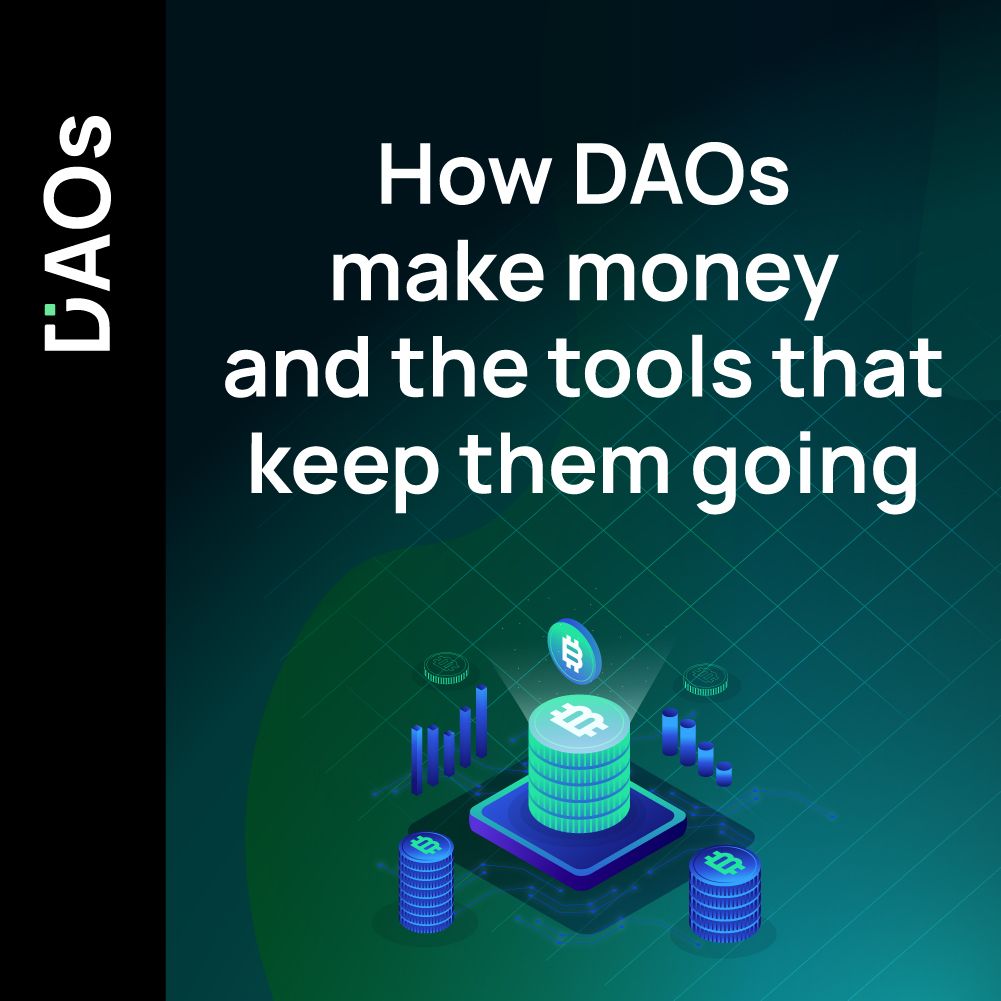09: How DAOs make money and the tools that keep them going

DAOs or Decentralized Autonomous Organizations are a compelling use case of how blockchains can revolutionize the way organizations function in today's world. With a decentralized structure and no central authority, every member has an equal say in how a DAO works. But how do DAOs make money? And what are the tools that keep them ticking?
How DAOs work
DAOs are organizations built on blockchains and collectively run by their members. With a DAO, developers can start an organization from anywhere without being influenced by a central authority. Instead, they come together with a mission and carry out their plans collectively.
DAOs work based on smart contracts. These are codes on the blockchain, dictating the organization's operational procedures. The rules cannot be changed unless the majority of the group votes for change.
DAOs can make money in more than one way:
By raising dividends
Usually, DAOs make money by raising dividends from investments. Plus, DAOs also convince other individual investors to trust them and their idea.
By raising funds from DAO tokens
DAOs raise funds by issuing tokens or DAO coins, which can be purchased for membership, helping distribute voting rights among members. If people or entities are interested in a DAO's growth, they can invest in DAOs by buying the DAO crypto tokens and becoming a part of its function. These DAO crypto tokens are cryptocurrencies linked to the initial project. Buyers get voting rights in proportion to the tokens they hold and equity.
By raising funds from VCs.
Often DAOs will pitch to venture capitals(VCs) to raise capital with a clear focus on the mission of the DAO and the exit plans.

Tools used by DAOs
A DAO can be set up to serve any purpose, so developers need tools to serve the varied needs within the DAO ecosystem. These tools allow integration, organization, management of funds, reward system, voting procedure, and more. Let's take a look at some of the prominent DAO tools in use:
Aragon
Aragon is a tool that lets you create your DAO on an open-source infrastructure. It has multiple templates and apps to help you with the launch and voting rights distribution. Further, you can customize voting configurations and define token holders' rights.
According to Aragon, over 1700 organizations have been built using this DAO tool, including prominent DAOs like Decentraland and Curve.
OpenLaw
OpenLaw is a blockchain-based protocol used to create and execute legal agreements in the form of code. Using the tool, lawyers can digitally frame and secure legal agreements. In addition, you can include smart contracts in legal agreements and then execute them on the blockchain.
As a DAO, you can make legal agreements that function on Ethereum and engage in legal transactions using OpenLaw.
Gnosis Safe
Gnosis Safe is a tool that lets DAOs keep multiple-signature wallets for their transactions. A multi-sig wallet needs more than one signature to perform a transaction, keeping its treasury secure. It is a smart contract wallet built on Ethereum. DAOs manage pooled funds using the tool. Once the minimum number of members approves, the tool will execute the transaction safely.
Big DAO names such as SushiSwap and ENS use the tool.
JuiceBox
JuiceBox is a decentralized tool that allows DAOs to raise funding from the native community. Using the platform, you can design the fundraiser page, decide on funding structures, finalize fund distribution, and reward community members by distributing tokens.
Snapshot
Snapshot is a tool that DAOs use to conduct voting based on token or NFT ownership. Users can create proposals and conduct off-chain voting to decide various aspects of the DAO. Snapshot's features let DAOs operate voting in an organized manner and make governance easily accessible.
Discord
Discord is the go-to server for internal communications for many DAO communities. It gives members the power to communicate through voice, chat, or video. In addition, it allows multiple layers of permissions depending on the user's role. Further, there are options to plug in bots that bring added functionality.

Conclusion
The multiple ways DAOs can raise money to carry out their set purposes and the tools available enable to manage enable them to deliver on their promise. As the DAO landscape evolves, we can expect to see a large number of players added to this list and new revenue opportunities for investors in DAOs.

